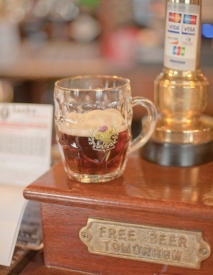By Duncan Harley.
Product placement, or embedded marketing, is as old as the hills. When, in 1873, Jules Verne published the adventure novel Around the World in Eighty Days in serial form, shipping companies seemingly queued at his publisher’s door in order to be mentioned by name and brand in the next episode.
The Marx Brothers films were full of intended placements with items as diverse as Life Savers Candy in Horse Feathers (1932) and of course Harpo Marx’s famous escape from the villains in Love Happy (1949) on the old Mobil logo, the “Flying Red Horse”, following an exciting rooftop chase around billboards promoting General Electric, Fisk Tires, Bulova watches, Kool cigarettes, Wheaties and of course Mobil Oil.
Even Fritz Lang was guilty of the use of the genre and his film M (1931) includes a 30 second prominent banner advert for Wrigley’s PK Chewing Gum.
Coca Cola, BMW, McDonalds, Pizza Hut and FedEx feature in many movies. Oreos, M & Ms and Hershey Bars feature in many books. The Oreo Cookie Counting Book for example features a cover write up which says:
“Children will love to count down as ten little Oreos are dunked, nibbled, and stacked one by one…until there are none!”
TV of course is not immune to the product placement intrusion. In The Bill, which of course has nothing whatsoever to do with that old creaky duck joke about Donald and Daffy running out of condoms and asking for a supply of prophylactics to be sent up to their hotel room and put on their bill, features all the villains driving about in old fashioned Jaguar cars with the all the cops riding about in fast, sexy, souped up Fords.
The tobacco industry has long used Hollywood as a vehicle to market their wares with the Coen Brothers The Man who Wasn’t There being one of the most talked about recent offenders. In this 2001 classic, the lead character, Ed Crane played by Billy Bob Thornton appears to get through around six packs of Marlboro during the films 1 hr. 57 minutes running time.
The BBC reported as far back as 2001 that:
“Cigarettes are still prominently displayed in films, despite a voluntary ban on “product placements” a decade ago”
A study of the top 25 US box office films each year from 1988 to 1997 found the use of actors to promote cigarette brands had increased ten-fold.
Little may have changed with Britney Spears, Paris Hilton, and Katherine Heigl all portraying the weed in a flattering light, despite the proven health issues and the criticism from anti smoking groups who view the actions of role models in promoting smoking as blatant advertising on behalf of the tobacco industry via the back door.
According to a recent World Health Organisation study, tobacco is also portrayed in 76% of Bollywood films; India of course being a fast growing market for an industry intent on portraying its products as cool and very western in nature.
All that may be changing however and we might actually have UKIP’s Nigel Farage to thank for this.
Nigel, who is of course NOT an MP, is a keen smoker and is also very well known for holding his political meetings in pubs. He likes to portray himself and the UK Independence Party (membership 27,000) as a people’s movement led by jolly and jovial free thinking lads just like the man next door.
He recently held such a meeting in an Edinburgh public house and had to be escorted from the premises by the local constabulary after being hounded by protesters chanting phrases such as “Ukip scum, off our streets” and “Immigrants Welcome Racists Not”.
So why is the UKIP leader so unpopular? Could it perhaps be to do with policies? I asked several folk in the shire’s pubs if they knew anything about what the UKIP and Nigel Farage actually stand for.
His stance on smoking is of course well known. Smoking rooms in pubs they felt were a great idea though! One local man went so far as to say that if Nigel Farage were to walk into the pub that night and buy him a pint then he would give the man his vote! Another drinker felt it was worth a pint and a nip at the very least!
However on issues such as UKIP’s stance on the compulsory abortion of potentially disabled foetuses, the banning of gay marriage, zero immigration, reduced taxation, leaving the EEC, cutting the UK budget spending to 1997 levels, the building of more prisons, increasing the defence procurement budget, the scrapping of the Crown Prosecution Service in favour of allowing police alone to decide on prosecutions, the doubling of the size of the Territorial Army and increase in total armed forces numbers by 25%, the building of three new aircraft carriers and 50 more Lightning fighter jets, the building of four new submarines equipped with US nuclear missiles and the banning of schools from showing Al Gore’s film An Inconvenient Truth they were somewhat less clear.
The membership of political parties is at best a very rough indication of popularity, but at the last count the Monster Raving Loony Party had 1,354 members, Labour had 60,000, Lib Dem 48,932 and the Conservatives 177,000. UKIP appears to have a mere 27,000 members in comparison.
Back in 2006, David Cameron branded Ukip members as “fruitcakes, loonies and closet racists”. In early 2013 the Monster Raving Loony Party’s Lord Jug wrote:
“As the official party of protest, we the Official Monster Raving Loonies strongly object to use of the terms ‘fruit cakes and loonies’ when describing Ukip. We who seek the Holy Grail of Loonyism strongly object to the cavalier use of these terms.”
The product placement marketeers must be shaking in their boots right now at the thought of decades of money and hard work spent creating a suave and sophisticated image for tobacco being destroyed at one fell swoop.
As for Nigel Farage, he will be nodding sympathetically while sipping from a pint of beer and puffing on his trademark cigarette.
Sources:
- http://www.smokefreemovies.ucsf.edu/problem/bigtobacco.html
- Marketing smoking in movies, Lancet: http://www.mascotcoalition.org/education/movies/lancet.html
- Wiki on ukip: http://en.wikipedia.org/wiki/UK_Independence_Party
- UKIP on UKIP: http://www.ukip.org/
- Monster Raving Loonies on UKIP: http://news.uk.msn.com/trending-blog/ukip-arent-loonies-we-are-says-election-candidate-824233/
- Comments enabled – see comments box below. Note, all comments will be moderated.


I think it’s a safe bet that Nigel and his motly crew will have minimal support in Scotland. The term “smarmy git,” springs to mind. Not the type of person Scots are drawn to naturally.
For sure Ron but beware the ides of march …